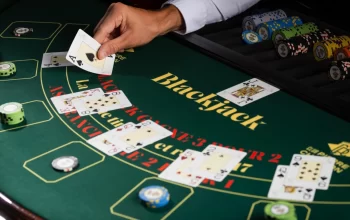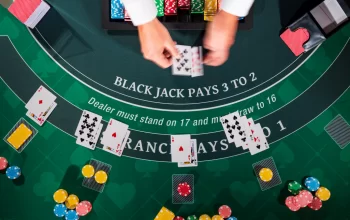Blackjack (commonly referred to as 21) is a casino card game with high levels of strategy and the potential for big rewards, though casinos remain wary of players who use math to gain an unfair edge in gameplay.
Players place bets before the dealer deals two cards to each player and herself, and win when either their hand total is higher than that of the dealer, or when she busts.
Basic rules
Blackjack is an engaging card game combining skill, strategy and luck. This classic casino staple can also be found online; many new USA casino sites now provide a vast array of blackjack variants.
Players and the dealer receive two cards at the start of a round. After considering their initial hands, players and dealer have several options for how they should proceed: “hit” (take another card), “stand” (stop taking cards), “double down” (double their bet, take one more card) or split (divide two identical cards into two separate hands).
The basic rules of blackjack are easy to remember, with only four main principles that should be strictly observed: players should never deviate from recommended strategy as doing so may lower winning percentage. Therefore, before beginning play it’s essential that players study odds of their starting hand before beginning; doing so can help players decide when it is appropriate to hit, stand, double down, split, or surrender and will help reputable websites provide these odds in various scenarios.
Variations
Blackjack is one of the few casino games that truly feels like pure chance; at the same time, however, it also requires math and statistics skills in order to succeed at. Recreational players often dedicate significant effort and time learning an approximate basic strategy approach in order to beat it – no wonder blackjack has become such a beloved table game at casinos!
Blackjack variants each offer their own set of rules, though most resemble classic blackjack in terms of foundation. Some even offer side bets and bonuses! Beyond this, though, each variant also differs slightly; some allow players to switch cards by paying a “buy” price or by swapping out one card at random during gameplay.
Some variations can also alter the house edge, although their effects tend not to be significant. For instance, when dealers must hit on soft 17s the probability of blackjack drops significantly while when increasing from two decks to six decks the house edge doesn’t change significantly.
Payouts
Blackjack is a fast-paced card game played with multiple decks of cards. Each player and the dealer receive two cards each, with the goal being to have an individual hand value that comes closer to 21 than that of the dealer without going over. Cards are valued according to their face value – 10s count as 10 and all other faces (Jacks, Queens and Kings) can either count for one or 11 depending on the situation. Aces may count either as 1 or 11.
Blackjack differs from other casino games by being more of a decision-making than probability game, so when making strategy recommendations it is essential not to focus solely on probabilities but on expectations as well. Historically payouts were 3 to 2, but many casinos now reduce them to 6 to 5, increasing the house edge and taking more money out of players’ pockets as well as rendering card counting nearly impossible. Players should therefore read all rules associated with their table before placing bets.
House edge
Blackjack is a game of probabilities and knowing your odds of success will enable you to make smarter decisions about how and when to bet your hands – helping to reduce house edges and improve chances of victory.
The house edge (HE) in blackjack can be altered through changing rules that alter probabilities for certain hands or dealer actions, employing optimal strategies or even by increasing or decreasing deck count during a game.
Many people view blackjack as a game of chance; however, its mathematics make it very scientific. Although decisions can appear random at first glance, there are clear right and wrong answers for each decision made in blackjack – giving mathematically minded players an advantage over untrained emotion-driven gamblers. Card counting experts can bring down the house edge nearly to zero; depending on which ruleset is being played with, payoff ratios can range anywhere between 3:2 to 6:5. These variations all impact how the house edge can change during each hand played





